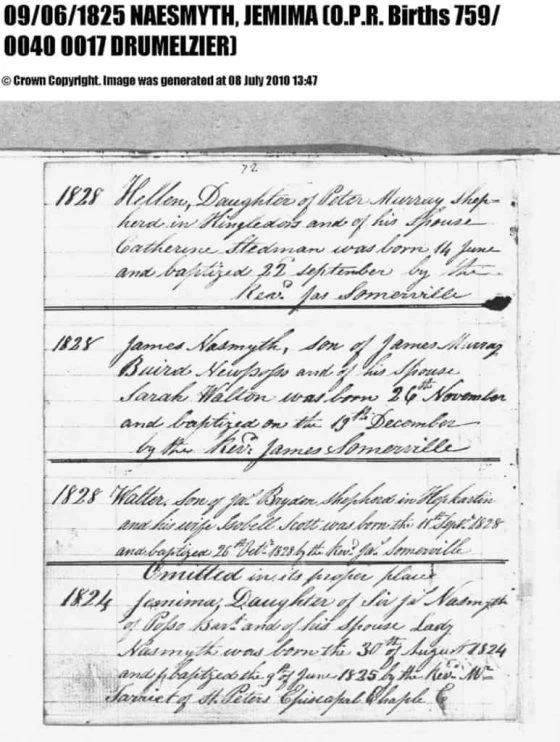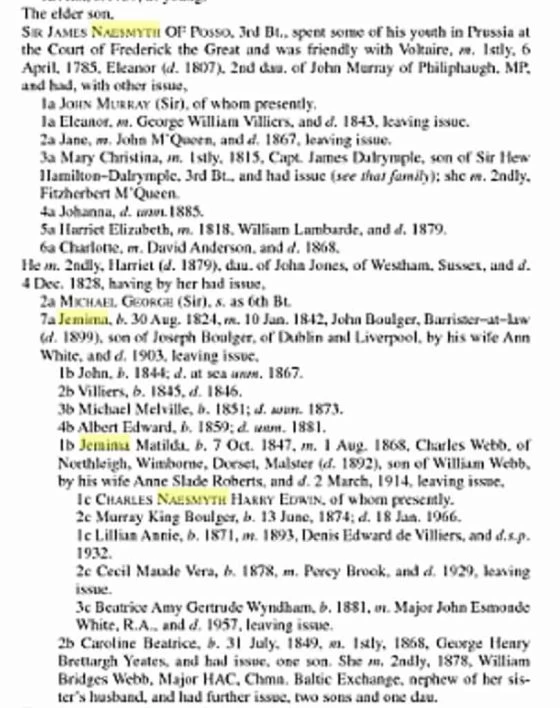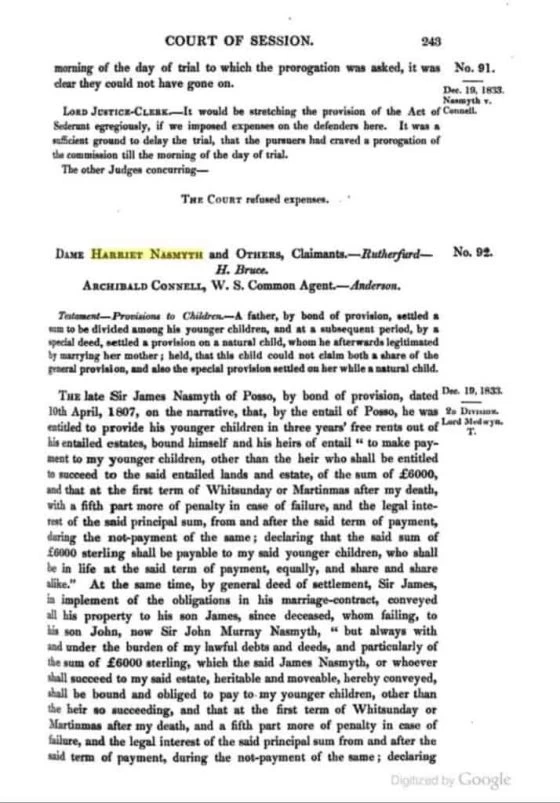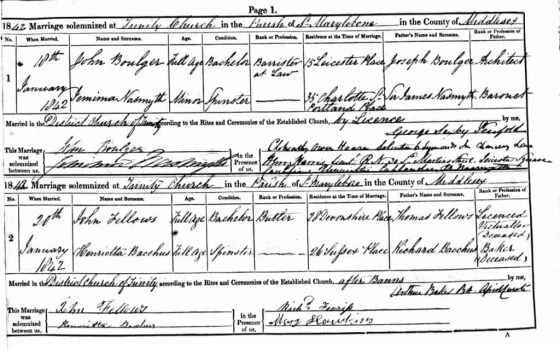John Boulger and Jemima Naesmyth
John Boulger
John Boulger was born in Dublin, Ireland in 1813. He was the son of the architect Joseph Boulger, who worked in Dublin and Liverpool and his wife Ann White.
Jemima Naesmyth
Jemima Naesmyth was born on 30 August 1824 in Drumelzier in Peeblesshire, Scotland. She was the illegitimate daughter of Sir James Naesmyth of Posso, 3rd Baronet and his mistress Harriet Jones of Edinburgh.
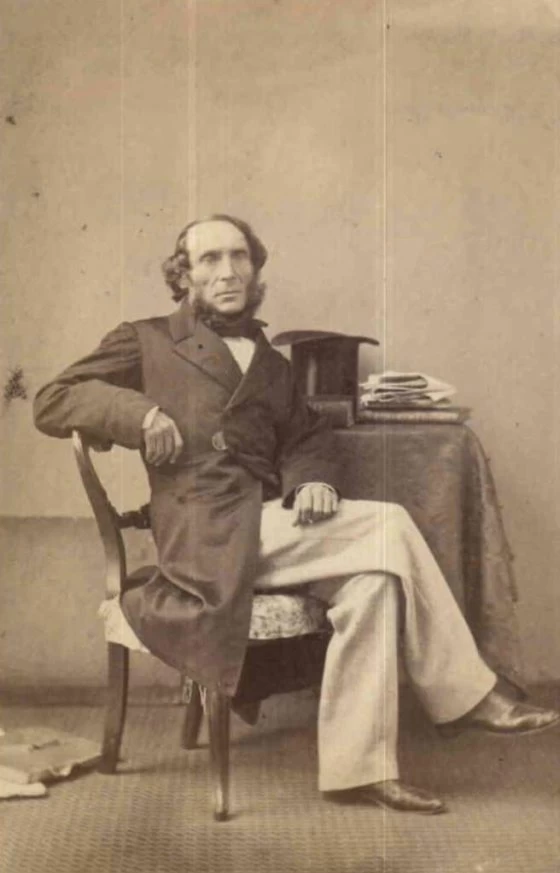
John Boulger
John Boulger was a Barrister at Law, but he was also the editor of the Civil Service Gazette. He seems to record his occupation more frequently as “newspaper editor” than he does “barrister at law” and I expect he is prouder of his role for the Gazette.
The Gazette has a long and established history, and has been at the heart of British public life for almost 350 years
During the 17th century, potentially ‘reckless’ publishing of articles – often just scurrilous rumours issued in pamphlet form – was thought to endanger national security, and this led to a climate in which the printing of any news not pertaining to the coverage of events abroad, natural disasters, official royal declarations and the most sensationalist of crime reporting was largely prohibited.
As a consequence, the British press was an ill-developed and badly defined industry. The introduction of censorship in 1663, together with the licensing of all news publications, did little to encourage the growth of a healthy press.
Jemima Naesmyth
Jemima was the illegitimate daughter of Sir James Naesmyth of Posso, 3rd Baronet and his mistress Harriet Jones of Edinburgh. As she was illegitimate she was unable to inherit from her father’s will, so he made a generous Bond of Provision to provide for her after his death.
The photograph opposite was taken in Ramsgate in 1863. The Boulger family seem to have divided their time between their house in Pimlico and a property in the Margate, Ramsgate area.
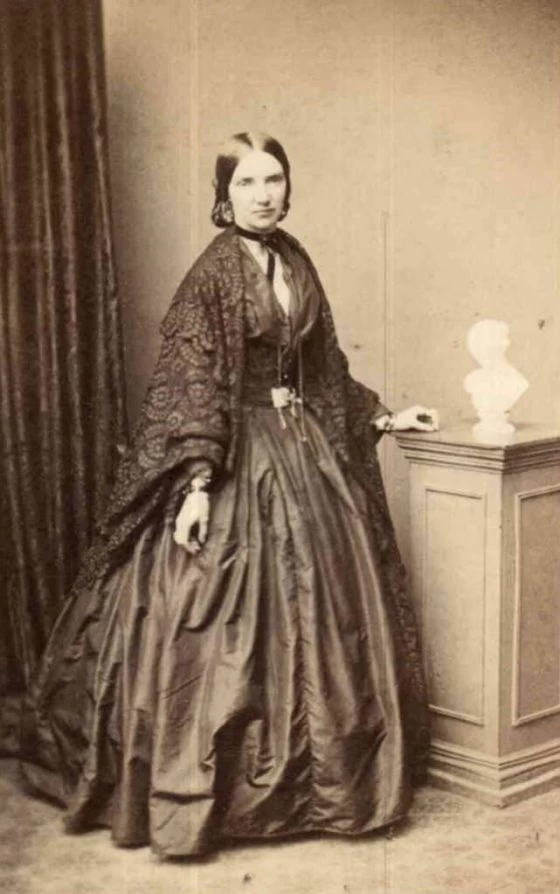
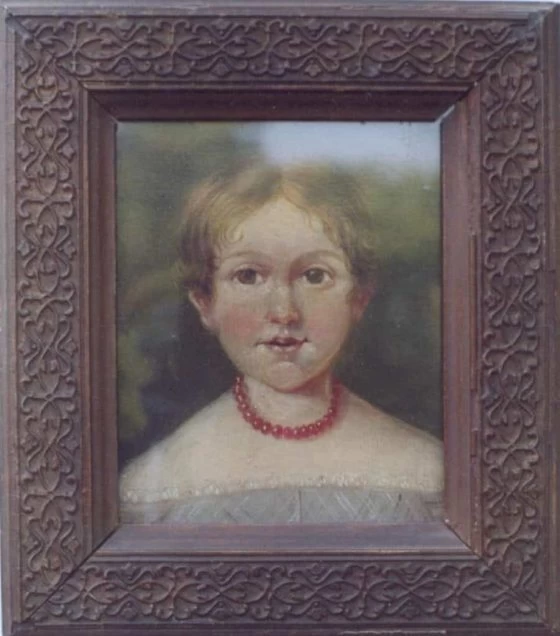
Jemima Naesmyth
The painting opposite was supposedly painted of Jemima when she was a child in Dawyck House.
Birth – Jemima Naesmyth
Jemima was baptized at Drumelzier Church, Peeblesshire, in the Scottish Borders. Jemima was born illegitimate in 1824, but she was legitimated under Scottish Law when her father eventually married her mother.
The Baptism Register records her Baptism in 1828, with a note “Omitted in its proper place”. Presumably this was a convenient attempt to backdate the baptism.
The entry reads:
1824. “Jemima, daughter of Sir James Nasmyth of Posso Bart. and of his spouse Lady Nasmyth, was born the 30 August 1824 and baptized the 9 June 1825 by the Rev Mr Tarriet of St. Peter’s Episcopal Chapel.”
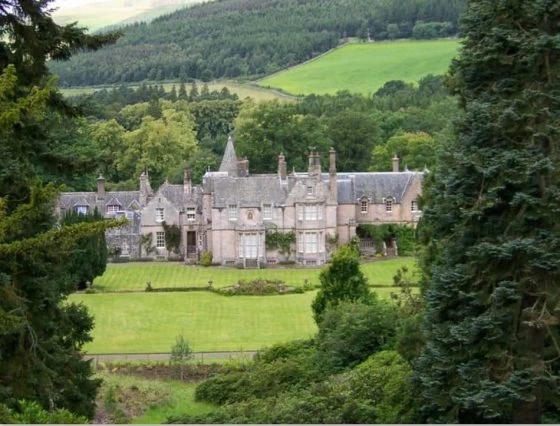
Dawyck House
Dawyck House is the ancestral home of the Naesmyths of Posso. It is located amongst the stunning scenery of Upper Tweeddale, near the village of Drumelzier. The gardens at Dawyck are now open to the public as a regional garden of the Royal Botanic Garden Edinburgh.
Jemima spent her childhood in this idyllic setting before moving to London when she was older.
Burkes Landed Gentry of Scotland
Sir James Naesmyth of Posso, 3rd Baronet, appears at the top of the list in the pedigree chart opposite. He had six children with his first wife, Eleanor. After she died in 1807, he appears to have had two further children with his mistress Harriet Jones of Edinburgh. As he was not married to Harriet Jones, these two children were illegitimate, or “born on the wrong side of the blanket” to use a colloquial phrase of the time.
His daughter, Jemima, the subject of this page, had several children, one of whom was Caroline “Beatrice” Boulger who married George Yeates.
Proceedings in the Court of Session
Sir James Naesmyth, by a bond of provision, settled a sum to be divided among his children. But, as two of his later children were illegitimate they would be unable to inherit from this bond of provision, so by special deed he settled a provision on his illegitimate child (Jemima).
The report of the proceedings in the Court of Session in Edinburgh is very clear and the Judge states his opinion that Jemima was undoubtedly his favourite child.
When he subsequently married his mistress Harriet Jones, this meant that Jemima was legitimated under Scottish Law. After Sir James’ death it became clear that Jemima stood to inherit twice. Firstly by the bond of provision as she had the same legal status as all her half siblings; and secondly under the special deed created specifically for her.
The Judge held that in spite of the fact that Jemima was clearly his favourite child, she should not be entitled to inherit twice from his will.
Marriage
John Boulger and Jemima Naesmyth were married in the Trinity Church in the parish of St Marylebone in London on the 18 January 1842.
At the time of their marriage, John was living at 15 Leicester Place, London and Jemima was living at 35 Charlotte Street, Portland Place.
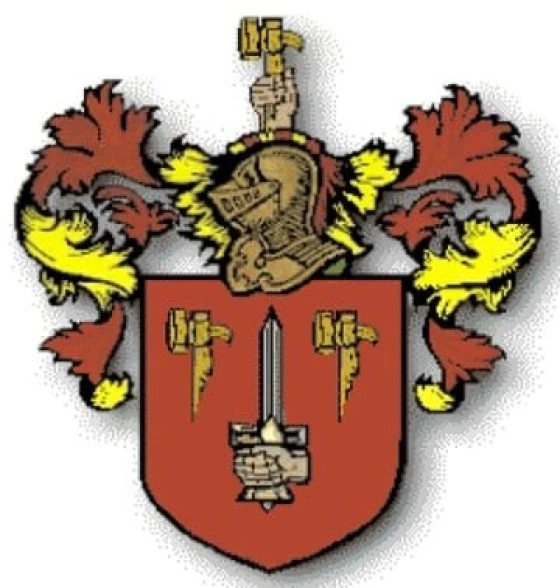
Naemyth Arms
On the arms of the Naesmyth of Posso are two broken hammers. The family trace their descent to a stalwart knight, who while in attendance on Alexander III was unable to repair his armour, but so atoned for his lack of skill as a blacksmith by his bravery in the fight that after its conclusion he was knighted by the king with the remark that, although ‘he was nae smith, he was a brave gentleman.’
